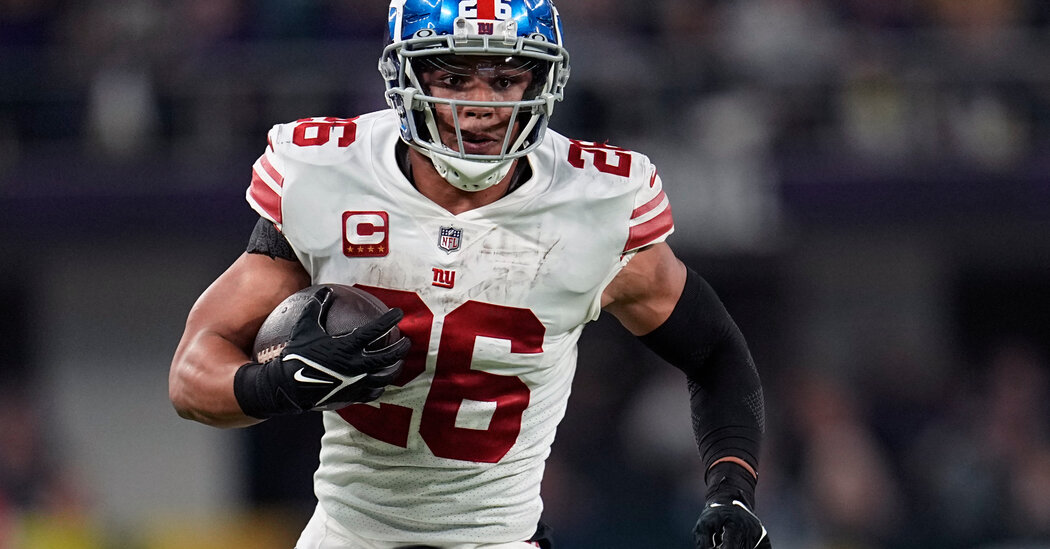Why It Matters: Barkley is one of the best at his position.
A two-time Pro Bowl selection, Barkley has been a mainstay of the Giants’ offense since the team drafted him No. 2 overall in 2018, and he gave the team an identity as it moved on from longtime quarterback Eli Manning.
He was named offensive rookie of the year in his first season, and his explosive runs helped make him the face of the league, though ankle and knee injuries kept him out of 21 games from 2019 to in 2021.
Barkley returned last season to help lead the Giants (9-7-1) to their first playoff appearance since the 2016 season. Behind his 1,312 rushing yards on 295 carries (both fourth-best in the NFL) and 10 rushing touchdowns, the Giants were a top-5 rushing team and scored 21 touchdowns on the ground compared to 17 passes.
The team’s decision to offer Barkley the franchise tag has been a point of debate in NFL circles, even with members of the Giants’ rivals speaking out for him. In April, the Cowboys defensive ends Micah Parsons argued on Twitter that Barkley is the center of the Giants’ offense. “Monday morning’s plan is we can’t let SAQUON BARKLEY WATCH US!!,” he wrote, adding “Pay him!”
The Background: Teams refuse long-term deals for running backs.
Barkley is likely looking for a deal on par with his career-highs.
His four-year rookie deal is worth $31.19 million and the team picked up his option for $7.2 million last season.
Christian McCaffrey of the 49ers had the highest average salary for a running back at $16 million, and Alvin Kamara of the Saints earned $15 million. Derrick Henry of the Titans, Nick Chubb of the Browns and Joe Mixon of the Bengals will each make at least $12 million per year on their deals.
Barkley teased in a report last week who says he makes $16 million annually and continues to load his social media accounts with images from his off-season workouts.
But he can negotiate well for his personal game and to force a better market value for the run, whose average payment is decreasing.
“The trend right now is not paying running backs, so everybody’s like, ‘OK, we don’t have to do this,'” Chargers running back Austin Ekeler saidwhich added that it takes a top performer to prevent or to sign a big long-term deal to reverse the trend.
Josh Jacobs of the Raiders and Tony Pollard of the Cowboys also failed to reach long-term deals with their teams and are expected to play under the franchise tag, the average salary of the top five players at that player’s position. The number of running backs is small compared to the money for quarterbacks ($32.4 million this year), offensive linemen ($18.24 million) or even tight ends ($11.35 million).
What’s next
If Barkley accepts the Giants’ tag, the two sides won’t negotiate a long-term deal until after the regular season.
If he doesn’t accept the tag, Barkley can hold back and not play. He won’t be docked pay for missing training camp dates but will lose wages if he sits out games. The Giants could also revoke the franchise tag, a highly unlikely move that would make Barkley an unrestricted free agent.
The more likely outcome: Barkley temporarily holds back to make his displeasure known but ends up reporting to camp. He has always said he wants to retire as a Giant and moved his representation to facilitate negotiations. He is currently represented by Kim Miale of Roc Nation and Ed Perry of Creative Artists Agency.
Once the regular season is over, the Giants and Barkley will be able to pick up the talks that will most likely end with a deal going through. He’s been a strong personality in a locker room that has seen three different head coaches during Barkley’s tenure, and the team’s confidence in Barkley’s running attack and quarterback Daniel Jones won’t diminish anytime soon. .
